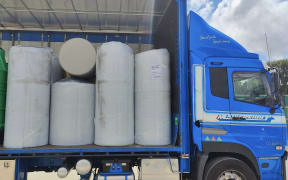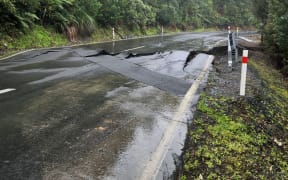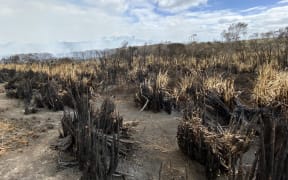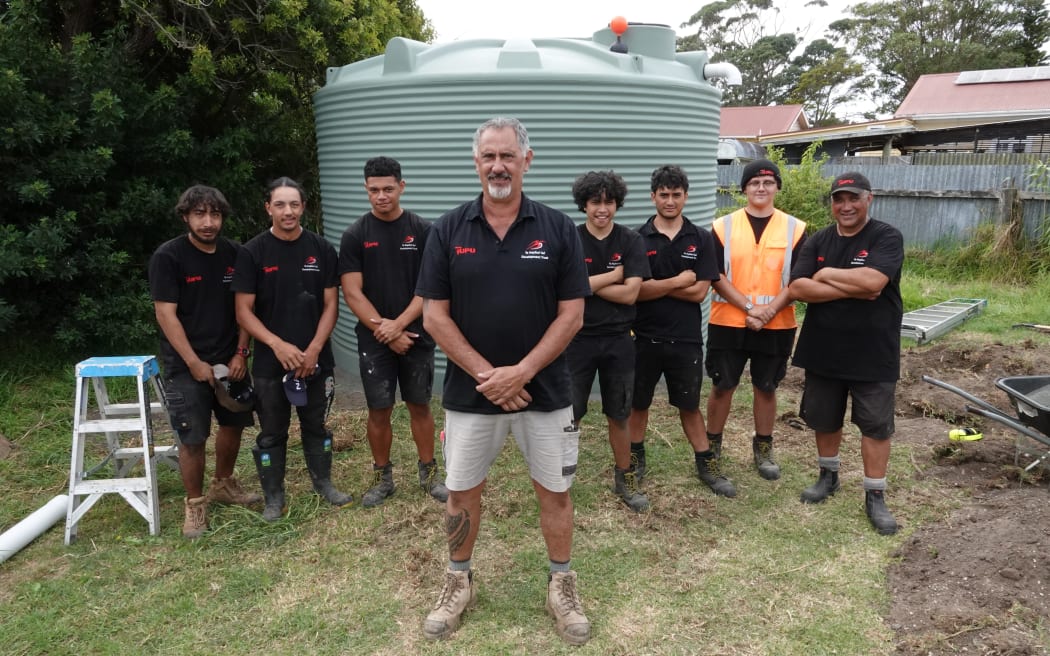
Site supervisor Rob Purchase, centre, with Tupu Plumbing tauira (students) and kaimahi (workers). Photo: RNZ
An iwi-led drought relief programme is changing lives in the Far North, one water tank at a time.
On Wednesday, it was Atholene Ngauma's turn to get a rainwater tank installed at her home in Waipapakauri, north of Kaitāia.
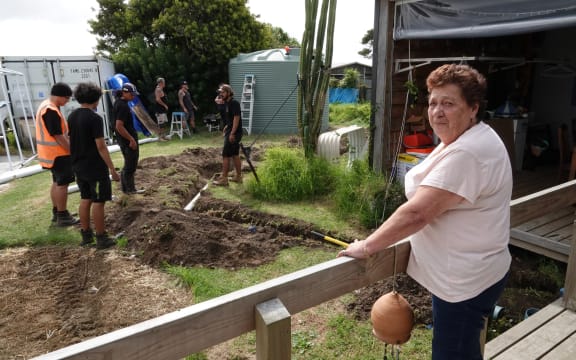
Home-owner Atholene Ngauma watches as the Tupu Plumbing team install her rainwater tank. Photo: RNZ
Until now the great-grandmother had to make do with water that was discoloured, tasted bad, and was unsafe to drink.
"My water's from a bore and everything is yellow. The toilet is yellow, the shower is yellow, the washing - the whites - are yellow."
Ngauma (Te Aupōuri, Te Rarawa) had to buy bottled water for drinking and cooking, and even for bathing one of her mokopuna.
She suffered from a number of health conditions and worried the bore water she relied on could make them worse.
Having reliable, drinkable water in her home would be life-changing, she said.
"It'll mean heaps, because apart from being able to drink the water, and have clean washing, I've got four grandchildren and eight great-grandchildren. The kids always come and go, and we're buying in water all the time."
The water tank was installed by Puna Wai Ora, also known as Te Hiku Drought Relief Programme.
The scheme is led by Te Aupōuri Development Trust, and was funded by an $8 million grant from the National Emergency Management Agency in the wake of the 2020 drought.
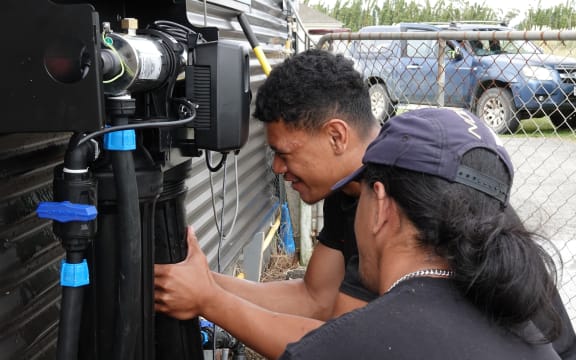
Tengo Christie installs a water filter while fellow tauira (trainee) Gabe Wharekawa looks on. Photo: RNZ
The drought - one of the worst in Northland's history - exposed the precarious living conditions of many Far North whānau, especially those who didn't have access to town water supplies.
Various Far North plumbers have been installing rainwater tanks for Puna Wai Ora, but late last year Te Aupōuri Development Trust set up its own plumbing venture.
Tupu Plumbing doubles as a training scheme taking on half a dozen youth at a time, most of whom had been unemployed for a year or more.
The idea is to give them skills and help them into apprenticeships and eventually trade careers.
Tupu Plumbing site supervisor Rob Purchase (Tuwharetoa) said the young men had learned fast.
At first they took an average of two days to install a tank; now they were knocking out almost one a day.
"It had its challenges initially. They didn't have any experience in the kind of work we're doing but they've picked it up very quickly," Purchase said.
"Within a month we got a good rhythm in place, and now they're pretty good. They're doing most of the work without supervision.
"We hope this is going to be the first step in the career that keeps them employed for life. If they're able to get from here into an apprenticeship and then to be a tradesman, they shouldn't be unemployed again for the rest of their lives."
Purchase said the programme was also life-changing for families who received water tanks.
"It's huge. You see it on the faces of the whānau when we're in there and doing these jobs. When we leave at the end of the day they've got 12,000 litres of water to start them off, so they've got running water at the tap that's clean."
An elderly couple in the remote Peria Valley, for example, had only a 1000-litre drum for collecting rainwater.
"So if it didn't rain for a couple of weeks they had to travel 45 minutes into town to get water. They used a long drop outside because they didn't have water to flush the toilet. The day we were there we put in a 25,000-litre tank and they were running the tap, washing the dishes, flushing the toilet in the house. It's an immediate change, especially for the elderly," Purchase said.
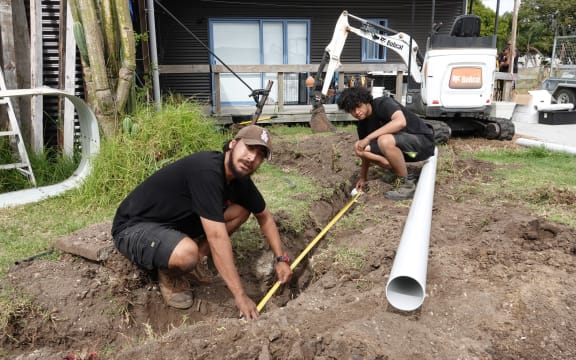
Tauira (trainees) Pete Nathan, front, and Tyreese Martin lay a rainwater pipe. Photo: RNZ
Pete Nathan (Ngāti Kuri) is one of the current trainees.
Before a friend referred him to the scheme, he'd been living on the benefit in emergency housing, with little money left for kai or other expenses.
The 21-year-old said the programme had turned his life around and given him a sense of achievement.
"I had no idea about plumbing before I started, but now I'm motivated to get to work every day and I just want to work more and more," Nathan said.
"I've learned so much about time management, taking responsibility and also plumbing skills like spouting, how to install water tanks, and how to use power tools which I've always wanted to learn. It's totally changed my perspective on work."
Puna Wai Ora programme manager Mihi Harris (Te Rarawa, Ngāpuhi) said the tank installed at Atholene Ngauma's home was the 305th to date, and the 50th by Tupu Plumbing.
Since Tupu Plumbing started last October the programme's pace had doubled, with the number of tanks installed jumping from 200 to more than 300 in less than five months.
The scheme prioritised whānau around Te Hiku (the top of the Far North) in areas prone to drought, with Community Service Cards, no access to reticulated water, connections to Te Hiku iwi, and history of contracting water-borne diseases.
Harris said the funding was initially expected to pay for about 800 water tanks, complete with spouting, filters and, where possible, UV treatment to meet the national drinking water standards.
Inflation since the programme was announced meant that number was now likely to be around 600.
The tanks were generally 25,000 or 30,000 litres, and aimed to keep a family supplied with water even if no rain fell for 50 days.
When the installation of Atholene Ngauma's tank was completed, she was looking forward to one thing above all else.
"To have a shower and wash my hair, so it's nice and soft," she laughed.
* According to the Northland Regional Council, half of all Northlanders do not have access to a reticulated water supply. The figure for the Kaipara District, 70 percent, was even higher, and for Northland marae the figure was 97 percent. Nationally, the figure is about 15 percent.
